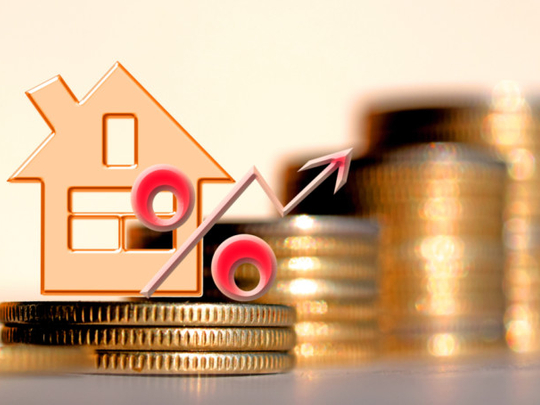
While a marginal increase in mortgage rates is expected in the UAE, experts say there are many more factors that influence homebuyers’ decision to buy property. People who want to switch from renting to owning homes or upgrade to bigger homes, and investors who want to take advantage of the high yields in the real estate market will still find borrowing a viable option to cater their needs. Here is what financial experts say buyers should consider about mortgage.
Fixed rate offers
Sawan Karia, managing director, Home Matters
The last US rate hike was widely expected and priced into the market, so no significant impact was felt in the UAE and rates remained stable. Home Matters expects one or two further rate increases by the US Federal Reserve before year-end. There is a high correlation between US rates and the UAE Central Bank Emirates Interbank Offered Rate (EIBOR) rate, so we are likely to see a marginal increase in mortgage rates here. Variable rates offered in the form of EIBOR-linked or bank variable rates will rise with all banks in the UAE. However, many banks are already reducing margins to remain competitive and still offer attractive fixed rates for one to two years.
We have already seen a shift in customer appetite with most now looking for fixed rates instead of variable products. Longer-term fixed rates are few and historically, the maximum fixed rate period seen in the UAE was for five years. Only a handful of banks would offer such options and these have been removed or seen significant increases to counter future rate movements. The increase in rates might make buying less attractive, but rents remain stable, and with more affordable housing projects being handed over, expats wishing to stay in the UAE for the long term are taking advantage of what is still very much a buyer’s market. Sellers are also becoming more motivated with the probability of increased borrowing costs.
Global attractiveness
Rohit Garg, head of business banking, mortgages, liabilities and remittances, Mashreq Bank
The buyers have been expecting possible rate increases based on news reports since last year. An increase of 25 base points (bps) last year led to banks repricing their rates in the first quarter of this year. The real estate market is driven by the need of a customer to buy or own property; the rate charged is a secondary decision, which takes effect while comparing the mortgage offers available in the market. Even after the increase, it is still cheaper to own property in the long term than renting. However, the increase will result in a small increase in the monthly instalment or the tenor of the loan for mortgage buyers.
We have had two increases this year with the latest one being 25 bps. From the indications given by the US Fed, it is likely that there may be another increase by the end of the year or first quarter of next year, but it’s hard to predict the timing.
However, the real estate market in the UAE is affected by many factors, including the geopolitical environment, the economic environment, the demand–supply situation, etc. Our rates are still lesser than the rates offered in most countries and, therefore, the return and yield expected on property investment is still healthy. But this equation is getting more difficult with every increase.
A minor change
Pawan Dhawan, head of home finance, Noor Bank
Since the dirham is pegged to the US dollar, any change in the US rates has an effect on the UAE’s interest and profit rates as well. This will possibly result in an increase in interest or profit rates on a home finance in the UAE. Ultimately, any increase or decrease significantly depends on local market factors and the liquidity in the local market. If the liquidity is tight, the interbank rates will go up, and if the bank deposits are on the rise, the rates will tend to go down. Banks raise or lower financing rates based on its EIBOR.
In the home finance/mortgage industry, an increase in rate is typically passed on from banks to customers who are seeking a home finance for the purchase of the property. Therefore, it is likely that existing home finance customers who are on a variable rate may see a rate rise on their finances. That being said, home finance customers will only need to adjust for a relatively small hike in rates. For example, if a customer had availed a home finance around one year ago of Dh1 million over a tenor of 25 years at 4 per cent per year, when the rate is revised to 4.25 per cent per year, the monthly instalment impact of the 25 bps rate hike will approximately be between Dh135 to Dh140 per month. While this is an inconvenience, it is a minor raise in the grand scheme of things, and customers should not panic.
Competitive offers
Amer Khan, head of retail products and segments, Standard Chartered Bank
Interest rates are important but not the only deciding factor for homebuyers. People moving locations or upgrading to a bigger property will continue to avail finance options. With a relatively large pipeline in 2017-18 and developers offering favourable terms to support demand, the overall cost of buying a property is expected to stay flat despite the recent Fed rate hike.
Moreover, new loans and balance transfers from one bank to another have become cheaper in the UAE due to rising competition among retail banks. While lending rates could rise gradually, banks may not immediately pass this on to homebuyers. Our analysts expect an increase in interbank/repo rates of around 50 bps by year-end. However, this may not immediately reflect on homebuyers’ cash flows as banks will continue to try and gain and retain market share in an accelerating UAE economy.











